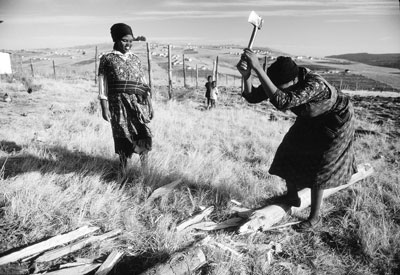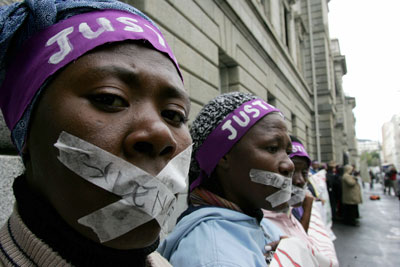South Africa Then and Now
Still in the Grip of Capitalism-Imperialism: Women
April 7, 2013 | Revolution Newspaper | revcom.us
THEN

Women in the Transkei region chopping wood, 1982
Photo: United Nations
Backbreaking work, no legal rights, isolation from their loved ones, dire poverty, and watching their children grow up hungry or die of curable illnesses was the lot of the vast majority of black women under apartheid.
Patriarchy is a foundation of every form of exploitative society, including the tribal societies that mainly characterized Azania before it was conquered by Europeans. But the conquest of Azania and the imposition of the apartheid system after World War 2 brought new extremes of suffering to Azanian women. By law, women were explicitly denied many rights, such as the right to own property, and were seen as dependents of their husbands.
Under apartheid, most land, and all the best farmland, was seized by the small white minority. In the countryside, 13 percent of mainly non-arable land was set aside as reservations ("bantustans") for the black population, making it impossible for people to support themselves by traditional farming. Most black men had to leave their homes and families and travel to mining or industrial areas for work. They were gone for months or even years; their families were rarely allowed to move with them. But these jobs barely paid enough to support the men, with only a little left over to send home. So women raised children on their own under conditions of desperate poverty, with little or no medical care or public education, and still had to work the barren land to raise enough food to get their families up to the subsistence level. Women were also shut out of most jobs and professions, with the exception of agricultural work and domestic work, generally the hardest and lowest paying jobs.
NOW

A protest to"resuscitate"justice for women and rape survivors outside a Cape Town High Court, South Africa, 2007.
Photo: AP
When apartheid ended in 1994 and the African National Congress (ANC) came to power, there was great hope for change among women, who had played a major role in the liberation struggle. The constitution of the new republic barred discrimination against women as well as gay people. And some middle class black women have been able to access education, enter professions, and rise to middle-level positions in the government.
But the situation for the masses of women has become a true nightmare. While a small minority of blacks became wealthy, poverty for the great majority has become even more dire, and women are mainly in the lowest paying jobs, making on average 2/3 the pay of male workers. Child support for the unemployed is $36 per child per month. (BBC, October 7, 2010) HIV/AIDS is at epidemic levels, with women most affected—one in four South African women is HIV positive.
But the oppression of women is most concentrated in astonishing levels of rape and domestic violence.
Almost 60,000 rapes were reported in 2012; experts estimate that only one in 10 rapes is reported to the police—that means roughly 600,000 rapes a year (BBC, January 10, 2013), a woman raped every 26 seconds. (New York Times, April 20, 2012, citing Doctors Without Borders)
In surveys, one in four men admit to having committed rape. (BBC, November 18, 2010)
40% of black women say their first sexual experience was forced. (New York Times, April 20, 2012, citing WHO)
A woman is murdered by her intimate partner every six hours. (New York Times, April 20, 2012, citing South Africa's Medical Research Council)
So-called "corrective rape"—the rape of lesbians in order to "teach them a lesson" or supposedly to "turn them" heterosexual—is also a massive problem—gay rights organizations in one city say they speak to about 10 such women each week. (BBC, October 7, 2010) In 10 years there were at least 31 "corrective rapes" that ended with murder—only two of these cases were prosecuted.
In many ways this epidemic of violence against women is part of the brutal legacy of apartheid—rape levels started to soar in the 1980s. But the ANC government has worked in many ways to reinforce the patriarchal ideology that is at the root of all this:
President Jacob Zuma, who is also head of the ANC, was himself charged with raping a family friend. At his trial, Zuma claimed that the woman "had dressed provocatively, in a traditional wrap-around kanga, and that it was against Zulu culture for a man to leave a sexually aroused woman unsatisfied." Zuma was acquitted. ("South Africa's Rape Crisis: 1 in 4 Men Say They've Done It", Megan Linsow in Time magazine, June 20, 2009) Zuma also upholds polygamy; he has 21 children by 10 different women, four of whom are his wives. Zuma appointed a fundamentalist Christian minister to be Chief Justice. In past court rulings, Judge Mogoeng Mogoeng has acquitted a man accused of raping his wife because she "tempted" him with her nightclothes; has questioned whether it is possible for a man to rape his wife; has reduced the sentence of a man convicted of raping a 7-year-old girl to 18 months (the minimum possible sentence). He also agrees with his church’s view of homosexuality as an abomination.
In another case, where two teenage boys drugged and raped a schoolmate, the National Prosecuting Authority announced it would charge all three of them with having underage sex.
The ANC government is seeking to pass a law that would make traditional tribal courts the only courts to which rural women would have access. Unlike the regular courts, the tribal courts do not even grant formal legal equality; for instance, these courts will routinely evict a woman from her home if her husband dies, divorces, or deserts her and if she does not have any male children—the home is then passed to the closest male relative. And a widowed woman is not even allowed to appear in these courts for six months after the death of her husband because she is considered "impure."
If you like this article, subscribe, donate to and sustain Revolution newspaper.